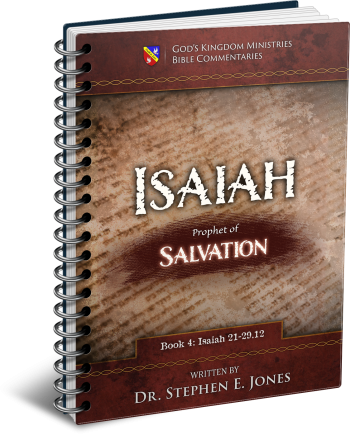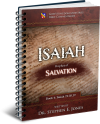Latest Posts
View the latest posts in an easy-to-read list format, with filtering options.

Isaiah is the prophet of Salvation. He is also known as the truly "Universalist" prophet, by which is meant that He makes it clear that salvation is extended equally to all nations and not just to Israel. He lived to see the fall of Israel and the deportation of the Israelites to Assyria, and he prophesied of their "return" to God (through repentance). He is truly a "major prophet" whose prophecies greatly influenced the Apostle Paul in the New Testament.
Category - Bible Commentaries

Jerusalem’s refusal to repent, as pictured in the first part of Isaiah 22, is illustrated further by the example of Shebna, who was Hezekiah’s “treasurer” (KJV), “steward” (NASB), or Chief of Staff. Shebna was first demoted to a “scribe” and Eliakim (his coworker) was promoted to take his place. Shebna, then, was a prophetic type of the rebellious or carnal men in Jerusalem, while Eliakim was a type of the remnant (overcomers).
Isaiah 22:15-18 begins,
15 Thus says the Lord God of hosts, “Come, go to this steward [sakan, “steward, to inhabit, to indwell”], to Shebna, who is in charge of the royal household, 16 What right do you have here, and whom do you have here, you who hew a tomb for yourself in the rock? 17 Behold, the Lord is about to hurl you headlong, O man. And He is about to grasp you firmly 18 and roll you tightly like a ball, to be cast into a vast country; there you will die and there your splendid chariots will be, you shame of your master’s house.”
This is the only record we have of Shebna holding the high office of “steward.” When he first appears in the historical section, we find him already demoted to “scribe,” as Eliakim had already replaced him. Isaiah 36:3 says,
3 Then Eliakim the son of Hilkiah, who was over the household, and Shebna the scribe, and Joah the son of Asaph, the recorder, came out to him.
Commentators assume that Shebna had advised Hezekiah to seek help from Egypt and that the king finally decided to seek the word of the Lord through Isaiah. If that were the case, then Shebna had been only recently replaced by Eliakim, for when the king sent a delegation to Isaiah, Eliakim was already “over the household” and Shebna was already demoted to a mere scribe, or clerk.
Isaiah’s prophecy in chapter 22 came some time earlier while Shebna was still the steward. The text suggests that Isaiah had accosted him at the tomb that Shebna was building for himself, probably on the Mount of Olives. (Tombs were not allowed to be built within the city walls.)
The prophecy says nothing of a demotion, but it is plain from the history that this is what happened first. Only later was Shebna “cast into a vast country.” Because the Assyrian army was subsequently destroyed without capturing Jerusalem, we can only speculate as to how this was actually fulfilled. Who took Shebna captive? And did Hezekiah cast him out of the city and deliver him into the hands of the Assyrians?
Jewish tradition says that the Assyrians tied him to the tail of a horse, thinking that he had betrayed them. The implication is that Shebna had promised to convince the king to capitulate, but when Hezekiah turned to God instead, the Assyrians blamed Shebna for failing to deliver on his promise. When Hezekiah discovered the plot, he sent Shebna out of the city. Shortly after this, God destroyed the Assyrian army. The king (who survived) returned to Nineveh with only a handful of survivors (Isaiah 37:37), and perhaps Shebna was tied to a horse’s tail and dragged to Assyria.
Shebna’s name means “confusion,” linking him with Babylon (or the Tower of Babel), which had a similar meaning, “to confuse by mixing.” In those days people were often renamed later in life to commemorate some notable deed, whether good or bad. So Abram became Abraham and Jacob became Israel.
On the other hand, Ahithophel, who betrayed David, was probably not born with that name, because it means “foolish.” It is not likely that his parents gave him that name at his birth. It was, no doubt, the name recorded later in the king’s chronicles to remember him as a foolish person for backing Absalom and betraying David.
So also Shebna probably had been renamed after he proved himself unworthy of his office. His birth name was forgotten, and his new name (“Confusion”) stigmatized him for all time.
In Isaiah 22:16 the prophet first questions Shebna’s right to be the steward of the king’s household. The implication is that he was a corrupt official whose character and deeds had not yet been exposed or proven. While he was yet a trusted official in Hezekiah’s household, Isaiah saw him as a corrupt official. Perhaps this explains why Hezekiah did not consult with Isaiah until all other options had failed, until the city was in serious danger, and Hezekiah was in despair.
The reference to “your splendid chariots” in verse 18 is a reference to Shebna’s position as the record keeper, including numbering the troops and chariots. He served as the Secretary of Defense in addition to his other duties. From that position, he may have posed a danger to Hezekiah as well, for he may well have plotted a mutiny.
Isaiah 22:19-21 says,
19 “I will depose you from your office, and I will pull you down from your station. 20 Then it will come about in that day that I will summon My servant Eliakim the son of Hilkiah, 21 and I will clothe him with your tunic and tie your sash securely about him. I will entrust him with your authority, and he will become a father to the inhabitants of Jerusalem and to the house of Judah.”
Again, it is clear that this prophecy came to the prophet while Shebna was still in his position of authority. Isaiah knew that Eliakim was an honorable and honest man who was worthy of this authority. Eliakim, “Whom God raised, or Whom God sets up,” was to “become a father to the inhabitants of Jerusalem and to the house of Judah.” Obviously, the term “father” was used figuratively to mean one in authority and an example for all to follow.
Isaiah 22:22, 23 says,
22 Then I will set the key of the house of David on his shoulder, when he opens no one will shut, when he shuts not one will open. 23 I will drive him like a peg in a firm place, and he will become a throne of glory to his father’s house.
The key of the house normally was tied to a string or narrow cloth and hung upon the shoulder of the chief steward. It therefore represented the government, even as we read in Isaiah 9:6, “the government will rest on His shoulders.” No one was allowed to open a door or gate that the steward had shut, nor was anyone allowed to close a door or gate that the steward had opened.
This transfer of authority from Shebna to Eliakim proved to be prophetic of something greater, for we read in Rev. 3:7-9,
7 And to the angel of the church in Philadelphia write: He who is holy, who is true, who has the key of David, opens and no one will shut, and who shuts and no one opens, says this: 8 I know your deeds. Behold, I have put before you an open door which no one can shut, because you have a little power and have kept My words and have not denied My name. 9 Behold, I will cause those of the synagogue of Satan, who say that they are Jews and are not, but lie—I will make them come and bow down at your feet, and make them know that I have loved you.
As I explained in The Revelation, Book 1, chapter 11, there are seven churches of the New Testament which run parallel to the seven churches of the Old Testament. Hence, the sixth church in the Old Testament is the Hezekiah Church, which speaks of having strength to delay the captivity of the seventh church, the Church of the Captivity. The Hezekiah Church runs parallel to the Church of Philadelphia.
Each of the seven churches requires one of the seven Spirits of God (Isaiah 11:2). The Hezekiah Church and the Church of Philadelphia require the Spirit of Might (or Strength) to overcome the challenges of their time. Those who overcome are made Pillars in the Temple (Rev. 3:12).
Hence, we see that Eliakim was a type of Christ as well as a type of overcomer in the body of Christ. Not only was Jesus set up or established as the highest authority over the earth, but the overcomers themselves are seated with Him in heavenly places (Eph. 1:20; 2:6).
Eliakim was the son of Hilkiah. Nearly a century after Eliakim’s time, another Hilkiah was the high priest in Jerusalem. 2 Kings 22:8 tells us that he was the one who found the book of the law (Deuteronomy) while they were cleaning debris from the temple. This sparked repentance and revival. Since it was customary to name children after their fathers, it may be that this Hilkiah was a grandson of the Hilkiah whose son was Eliakim in the days of Hezekiah. If so, it is possible that Eliakim was the son of a high priest.
The temple reference in Rev. 3:12 suggests that Eliakim was a priest, even as the overcomers themselves are called to be “priests of God and of Christ” (Rev. 20:6). The broader lesson in the story of Shebna and Eliakim is that corrupt officials will not rule in the Kingdom of God. Though they may rule in the church, in time they will be replaced by those who are worthy.
Those who are worthy are those with the character of Christ, those who know how to exercise authority responsibly and with love. They will be given the key of David. The Hebrew word for “key” is maphteach, which carries a numeric value of 528, called “the Love Frequency.” It is Mi (short for “Miracle”) on the Solfeggio scale in music.
https://attunedvibrations.com/528hz/
The key of David, then, is love, which is seen also in the fact that David’s name means “beloved.” This suggests that overcomers are those who have learned to love as Christ loves. They are not self-centered, nor do they seek their own welfare or benefit. Having the character of Christ makes an overcomer “as a peg in a firm place” and gives honor to his father’s house.
Isaiah 22:24, 25 concludes,
24 So they will hang on him all the glory of his father’s house, offspring and issue, all the least of vessels, from bowls to all the jars. 25 “In that day,” declares the Lord of hosts, “the peg driven in a firm place will give way; it will even break off and fall, and the load hanging on it will be cut off, for the Lord has spoken.”
The prophet uses the metaphor of “bowls” and “jars” to denote Eliakim’s offspring, great and small, all of whom will play some role in the Kingdom. It is prophetic of the sons of God as well, some of whom are mere “bowls” with small capacity and some of whom are “jars” with larger capacity. Eliakim serves as a prophetic type of Christ, whose “peg” will be fixed and firm, whereas those representing Shebna will “break off and fall.”
It is a prophecy of the Kingdom, when corrupt leaders in the church will be replaced by those who have remained true to principles of Christ and who reflect His character and love.